The Dangers of Unhealthy Food: What to Avoid
Modern life moves fast, making it easy to grab quick, unhealthy food. Processed snacks and fast food are tempting but harmful. They can quietly harm your health. This article will show you the risks of unhealthy food and help you choose better.

Key Takeaways
- Processed foods often contain high levels of sugar, sodium, and unhealthy fats that can contribute to chronic health issues.
- Fast food may be convenient, but it’s typically high in calories, unhealthy fats, and lacking in essential nutrients.
- Sugary beverages and high-calorie snacks can lead to weight gain, obesity, and other metabolic problems.
- Artificial preservatives and additives in many processed foods can have negative effects on overall health.
- Making informed choices about the foods you consume is crucial for maintaining a balanced, nutritious diet.
Want to avoid these dangers and control your health? We’ll share key knowledge and strategies. You’ll learn to spot and avoid harmful foods. This will help you make healthier choices for a better future.
Understanding Unhealthy Food
Unhealthy foods are packed with unhealthy fats, too many calories, and added sugars. They often lack the nutrients we need. Eating too much of these foods can harm our health.
These foods have a lot of calories but not much nutrition. This can lead to weight gain and other health issues. It makes our diet nutritionally deficient.
They also have a lot of saturated and trans fats. These fats can increase cholesterol levels. This raises the risk of heart disease and other heart problems.
Unhealthy foods are also high in sodium. This can cause high blood pressure and other health issues. Many of these foods are high in added sugars. This can lead to weight gain, diabetes, and metabolic disorders.
Knowing what unhealthy foods are is key to making good choices. By watching out for high-calorie, high-fat, high-sodium, and high-sugar foods, we can eat better. We should choose healthier, whole-food options instead.
| Unhealthy Food Characteristic | Potential Health Risks |
|---|---|
| High in Calories | Weight gain, obesity |
| High in Saturated and Trans Fats | Increased cholesterol levels, heart disease |
| High in Sodium | High blood pressure |
| High in Added Sugars | Weight gain, diabetes, metabolic disorders |
| Low in Nutrients | Nutritional deficiencies, poor overall health |
Processed Foods: A Silent Threat
In today’s world, processed foods are everywhere. But they often hide a cost. They’re full of added sugars, sodium, and artificial preservatives. Unlike whole foods, they lack the nutrients we need.
Hidden Sugars and Preservatives
Processed foods often have hidden sugars. These can be high-fructose corn syrup, sucrose, or even fruit juice concentrates. Too much sugar can cause weight gain and increase the risk of type 2 diabetes.
They also have preservatives to last longer. Some are safe, but others, like BHA and BHT, might not be good for us. It’s best to avoid them.
Nutrient-Poor yet Calorie-Dense
- Processed foods are calorie-dense, meaning they have lots of calories in a small amount.
- But they often lack vitamins, minerals, and fiber found in whole foods.
- This mix can lead to weight gain and health problems like heart disease and type 2 diabetes.
Dealing with processed foods can be tough. But knowing the risks helps us make better choices. The next part will explore the dangers of fast food.
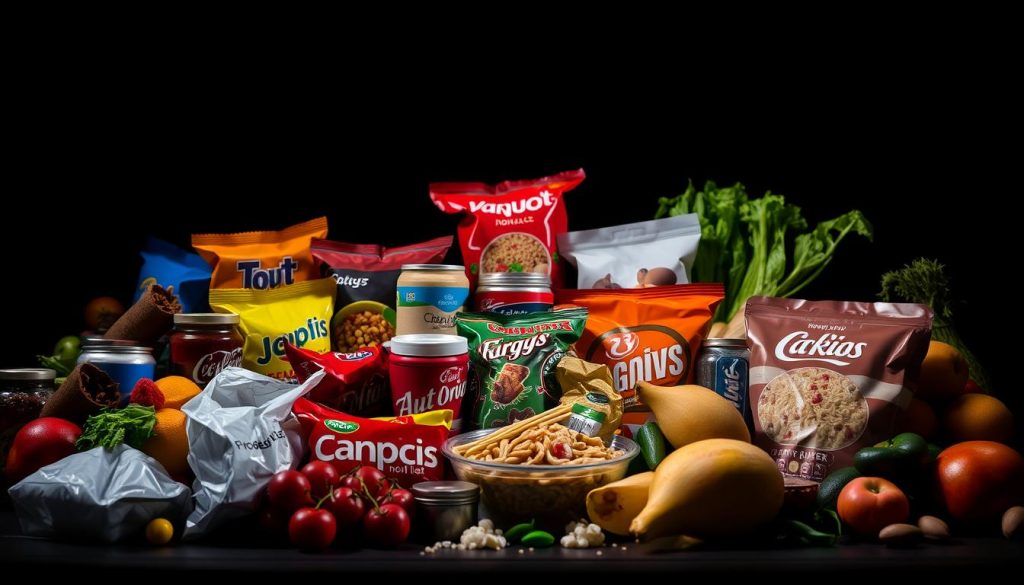
Fast Food: A Convenient Hazard
Fast food is quick and easy, but it’s not good for our health. These meals are full of calories, unhealthy fats, sodium, and refined carbs. They lack fiber, vitamins, and minerals. Eating fast food often can lead to weight gain, heart disease, and other health problems.
Fast food has a lot of calories. One meal can have more calories than we should eat in a day. This can cause weight gain and obesity. The fats in fast food, like saturated and trans fats, can also raise the risk of heart disease and stroke.
Fast food has too much sodium, which is bad for our health. It can lead to high blood pressure and heart problems. These meals also lack fiber and important vitamins and minerals, causing nutritional deficiencies and health issues.
- Fast food is often high in calories, unhealthy fats, and sodium, while being low in essential nutrients.
- Regularly consuming fast food can lead to weight gain, heart disease, and other chronic health issues.
- The convenience of fast food comes at a cost to our long-term well-being.
“Fast food may be quick, but the consequences can linger for years. It’s important to find a balance between convenience and health.”
While fast food might be tempting, it’s key to know its dangers. We should make healthier choices to protect our health and well-being.

Unhealthy Food and Obesity
The rise in obesity is linked to eating too much unhealthy food. Larger portions, easy access to fast food, and less activity are key factors. Obesity not only changes how we look but also raises serious health risks.
Contributing Factors and Risks
Eating too much of foods high in fat, sugar, and calories can lead to weight gain and obesity. These obesity risks include:
- Portion distortion: Larger serving sizes of unhealthy foods and sugary drinks can contribute to calorie overconsumption.
- Sedentary lifestyles: Decreased physical activity and a reliance on high-calorie diet and processed foods can disrupt the energy balance needed for weight management.
- Easy access to fast food: The convenience and marketing of unhealthy foods make them hard to resist, especially for those with busy schedules.
Obesity is a major risk factor for many health issues. These include type 2 diabetes, heart disease, certain cancers, and respiratory problems. Keeping a healthy weight through diet and exercise is key to reducing these obesity risks.
| Obesity-related Health Risks | Potential Consequences |
|---|---|
| Type 2 Diabetes | Increased blood sugar levels, insulin resistance, and overall metabolic dysfunction |
| Cardiovascular Disease | High blood pressure, elevated cholesterol, and increased risk of heart attack and stroke |
| Certain Cancers | Increased risk of breast, colon, endometrial, and other types of cancer |
| Respiratory Problems | Sleep apnea, asthma, and other breathing-related issues |
Understanding the obesity risks from unhealthy diets and sedentary lifestyles helps us take action. We can improve our health and well-being by making better choices.

The Impact on Heart Health
Unhealthy foods, especially those with saturated fats and sodium, harm heart health. Eating too much of these foods can lead to high cholesterol and blood pressure. This increases the risk of heart disease and stroke.
Saturated fats in unhealthy food are a big worry. They can increase LDL (bad) cholesterol, causing artery buildup. This restricts blood flow and raises the risk of heart attacks and strokes.
Sodium intake from processed and fast foods also affects heart health. Too much sodium can cause high blood pressure. This strains the heart and blood vessels, raising the risk of heart problems.
| Nutrient | Recommended Daily Intake | Impact on Heart Health |
|---|---|---|
| Saturated Fats | Less than 10% of total calories | Raises LDL (bad) cholesterol levels, increases risk of heart disease |
| Sodium | Less than 2,300 mg | Contributes to high blood pressure, increases risk of heart attack and stroke |
To keep your heart healthy, watch what you eat. Limit saturated fats and sodium intake. Choose a diet rich in nutrients to support your heart’s health.
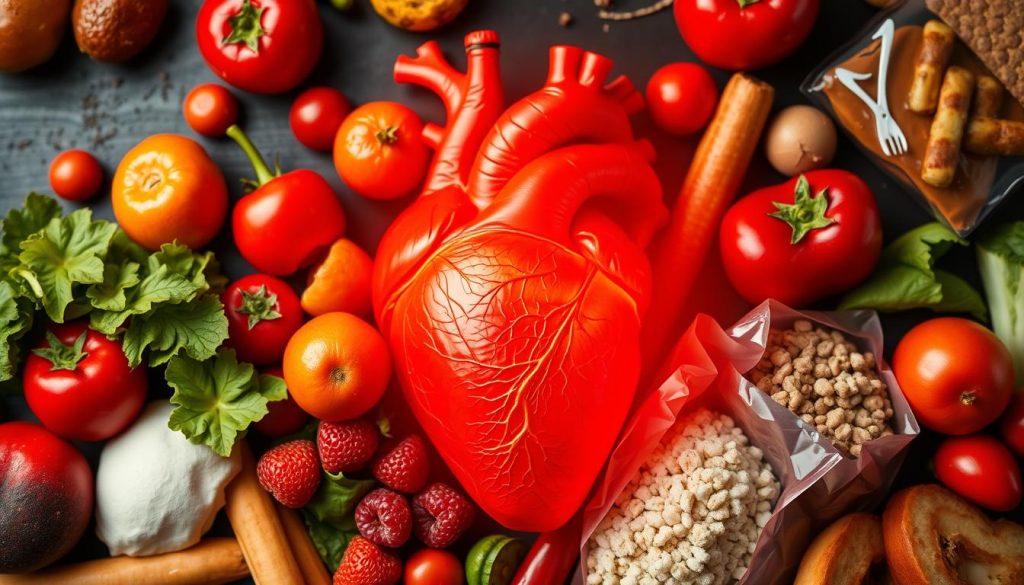
Unhealthy Food and Chronic Diseases
There’s a clear link between unhealthy foods and chronic diseases. Foods high in added sugars and unhealthy fats harm our health. They can lead to serious conditions like type 2 diabetes and some cancers.
Diabetes and the Sugar Trap
Drinking too many sugary drinks and eating processed foods can cause type 2 diabetes. These foods have lots of refined carbs and not enough fiber. This leads to high blood sugar and a higher risk of diabetes.
The Cancer Connection
Studies show eating processed and red meats, and sugary drinks raises cancer risk. This includes colorectal, breast, and prostate cancer. The unhealthy fats and preservatives in these foods might contribute to disease.
But it’s not just diabetes and cancer. Eating too much of these foods can also lead to heart disease, stroke, and even brain problems. Choosing healthy foods is crucial for our well-being.
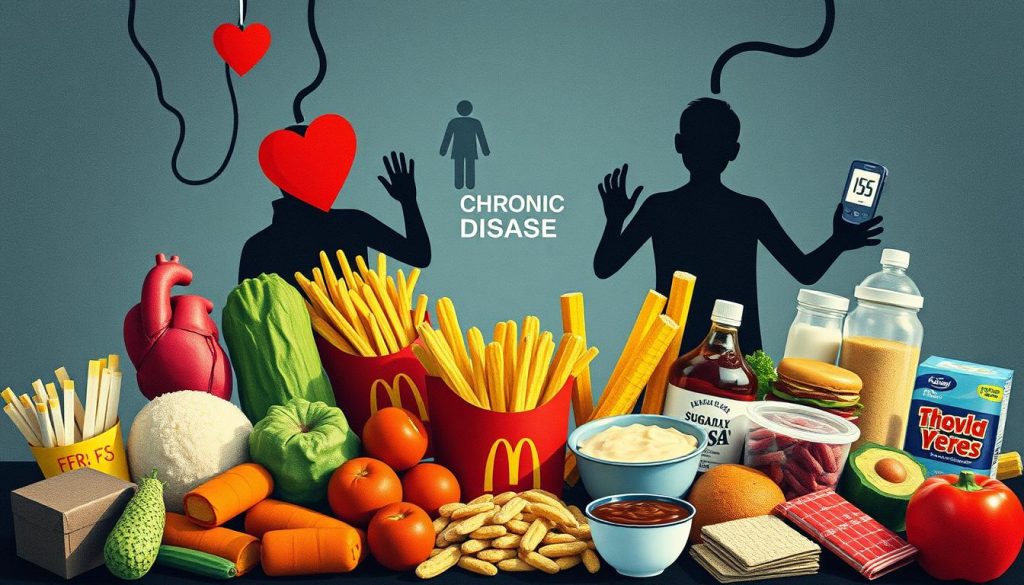
“The road to good health is paved with good nutrition.” – Bernardine Healy, former director of the National Institutes of Health
Additives and Preservatives: The Hidden Dangers
Many processed and packaged foods have additives and preservatives that can be harmful. These include artificial colors, flavors, and preservatives. They can mess with hormones, cause allergies, and lead to long-term inflammation.
The use of artificial additives in unhealthy foods worries many. These additives might make food look better, taste better, or last longer. But they can also harm our health in ways we don’t expect.
- Many artificial preservatives can mess with hormones, causing health problems.
- Certain food dyes might make kids act out or be too hyper.
- Too much sodium and sugar in processed foods can lead to obesity, heart disease, and type 2 diabetes.
It’s important to be smart when shopping and read labels well. Additives and preservatives might have different names. By choosing whole, natural foods over processed ones, you can live healthier.

“The more processed a food is, the more likely it is to contain harmful additives and preservatives.”
Emotional Eating and Unhealthy Choices
Emotional eating means eating unhealthy, comforting foods when we’re stressed or upset. This can lead to eating too much of high-calorie, nutrient-poor items. It can cause weight gain and harm our gut health. It’s important to understand why we eat emotionally and find better ways to cope.
Feeling stressed or down makes us want quick comfort. Our brains seek the feel-good chemicals that sugary snacks and processed foods provide. But, this comfort is short-lived and often leads to guilt and more unhealthy eating.
- Stress, anxiety, and depression often trigger emotional eating.
- Processed foods and sugary snacks might make us feel better for a moment. But they don’t give us the nutrients we need for lasting health.
- Healthy coping strategies like exercise, meditation, or talking to friends can help. They address the reasons behind emotional eating and help us eat better.
“Emotional eating is a vicious cycle that can have far-reaching consequences on our health and well-being. By understanding the triggers and developing healthier coping strategies, we can break free from this pattern and achieve a more fulfilling and balanced relationship with food.”
Fixing emotional eating needs a plan that covers both our feelings and physical health. By knowing what drives us to eat emotionally and using positive ways to cope, we can control our health. We can make healthy food choices that are good for our bodies and minds.

Unhealthy Food and Gut Health
The foods we eat greatly affect our gut health. Foods high in fat and sugar can upset the balance of gut bacteria. This can cause inflammation, digestive problems, and increase the risk of chronic diseases.
Processed and high-sugar foods harm our gut health. They lack nutrients and fiber that gut bacteria need. Instead, they introduce unhealthy components that can harm our gut and lead to health issues.
The Gut-Health Connection
Our gut is home to trillions of microorganisms, known as the gut microbiome. This diverse group of bacteria, fungi, and other microbes is vital for our health. They help with digestion, immune system function, hormone balance, and brain function.
When the gut microbiome is out of balance, it can cause many problems. These include digestive issues, chronic inflammation, and even neurological disorders.
Restoring Gut Health
To keep our gut healthy, we should avoid processed and high-sugar foods. Instead, we should eat whole, nutrient-dense foods. This includes fruits, vegetables, whole grains, lean proteins, and probiotic-rich foods like yogurt and fermented vegetables.
| Gut-Friendly Foods | Gut-Damaging Foods |
|---|---|
| Vegetables Fruits Whole grains Fermented foods Lean proteins | Processed foods High-fat, high-sugar foods Artificial additives Excessive alcohol Antibiotics (when not necessary) |
By choosing healthier foods, we support the growth of good gut bacteria. This helps keep our microbiome balanced. It promotes overall health and well-being.
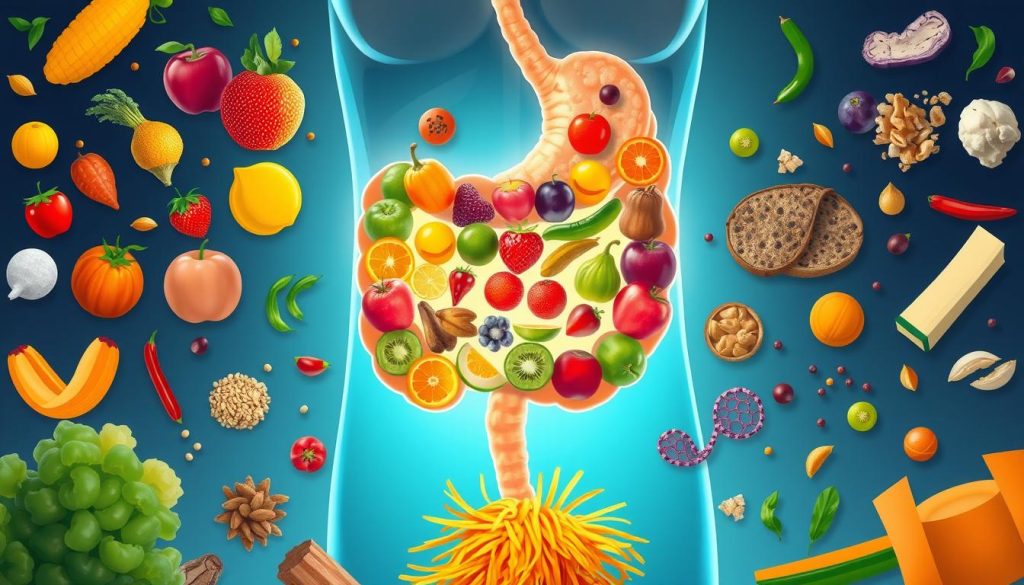
Reading Nutrition Labels
Learning to read nutrition labels is key to spotting unhealthy foods. By focusing on the ingredient list and portion sizes, you can make better food choices.
Decoding Ingredients and Portion Sizes
The nutrition label is full of useful info for avoiding processed foods and unhealthy foods. First, check the ingredient list for added sugars, sodium, and preservatives. These can harm your diet.
Also, look at the portion size on the label. Many foods have more than one serving. Knowing this helps you avoid eating too much of unhealthy foods.
- Learn the names for added sugars like high fructose corn syrup, sucrose, and maltose.
- Be cautious of long, unknown ingredients. They might be in processed foods or unhealthy additives.
- Compare the portion size to what you usually eat. This helps you understand your intake better.
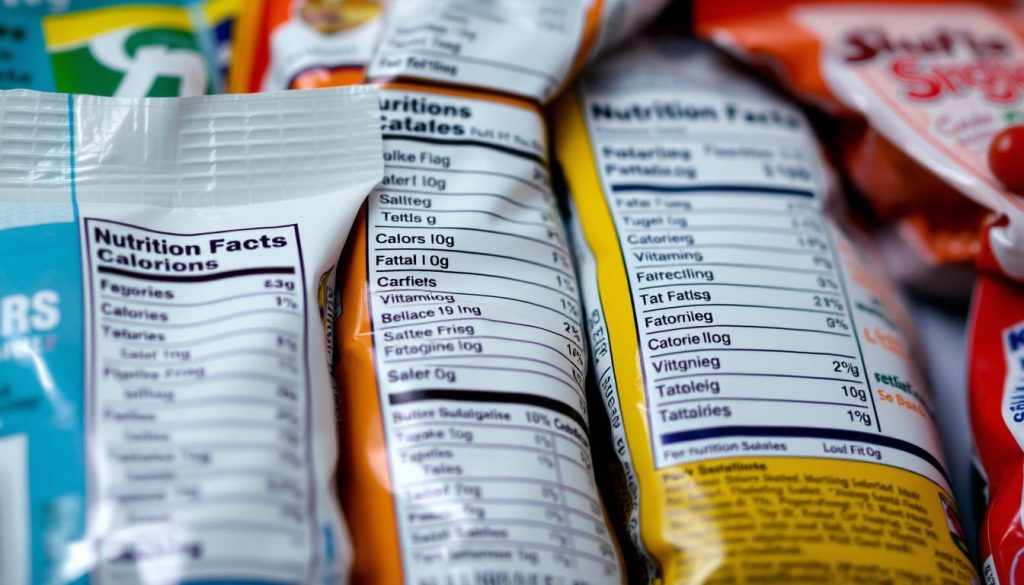
“Decoding nutrition labels is essential for making informed, healthy choices. Take the time to read and understand the information provided, and you’ll be well on your way to a more nutritious diet.”
By getting to know nutrition labels, you can become a more aware and careful shopper. This is the first step to a healthier life and avoiding processed foods and unhealthy foods.
Identifying Unhealthy Food
Today’s food world is full of choices, making it hard to pick the right ones. Knowing what unhealthy foods look like helps us make better choices. This way, we can avoid bad eating habits.
Unhealthy foods often have too much sugar, bad fats, and artificial stuff. These can lead to weight gain, obesity, and serious diseases like heart disease and diabetes.
To spot unhealthy foods, watch out for these signs:
- Too much added sugar, like high-fructose corn syrup and sucrose
- Bad fats like saturated and trans fats, which harm your heart
- Long lists of weird ingredients, which might mean artificial stuff
- High-calorie snacks like chips, cookies, and candy, which don’t give you much good
- Very processed foods that are stripped of nutrients
| Unhealthy Food | Healthy Alternative |
|---|---|
| Sugary soda | Unsweetened sparkling water |
| Fried fast food | Grilled or baked lean protein with fresh vegetables |
| Processed snacks | Fresh fruits and nuts |
Knowing these signs helps us avoid unhealthy foods. It’s a step towards a healthier diet.
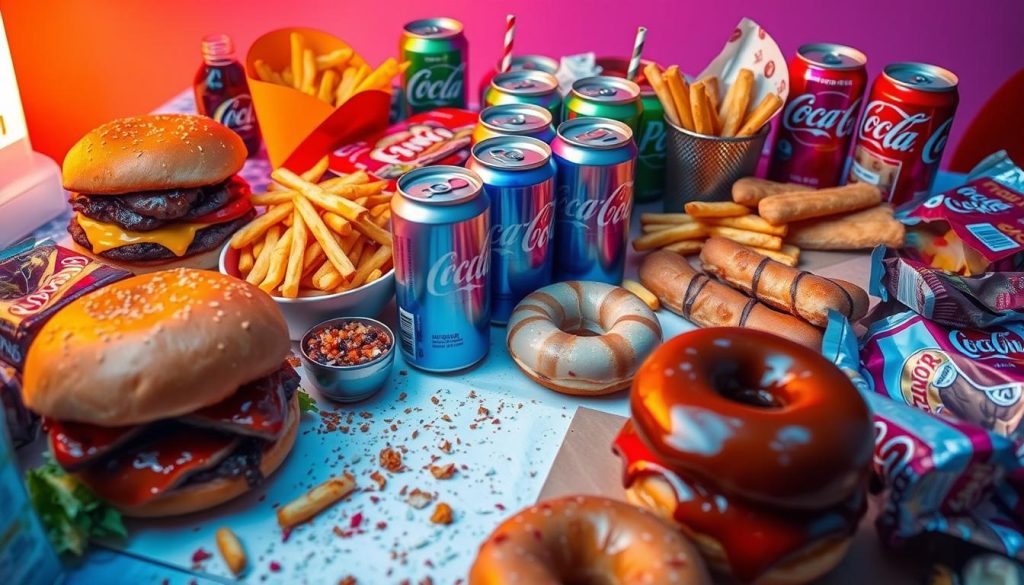
Making Healthier Food Choices
Eating a nutritious diet is key to staying healthy. It means eating more whole foods like fresh fruits, veggies, lean proteins, and whole grains. Try to eat less of processed, high-calorie, and high-sodium items. By finding a balance and eating in moderation, you can enjoy the benefits of a balanced diet and feel better overall.
Whole Foods, Balance, and Moderation
Whole foods, which are not heavily processed and full of nutrients, should be the base of your healthy eating plan. These include:
- Seasonal, locally-sourced fruits and vegetables
- Whole grains like brown rice, quinoa, and oats
- Lean proteins such as chicken, fish, and legumes
- Healthy fats from nuts, seeds, and avocados
It’s also crucial to have a balanced diet by adding all food groups in the right amounts. Remember, even healthy foods can be bad if you eat too much. By watching your portion sizes and trying different foods, you can feed your body well and stay healthy.
| Food Group | Recommended Daily Intake |
|---|---|
| Fruits and Vegetables | 5-9 servings |
| Whole Grains | 3-5 servings |
| Lean Proteins | 5-7 ounces |
| Healthy Fats | 20-35% of total daily calories |
By following these tips of whole foods, balance, and moderation, you can make a big step towards a healthier lifestyle and better health.
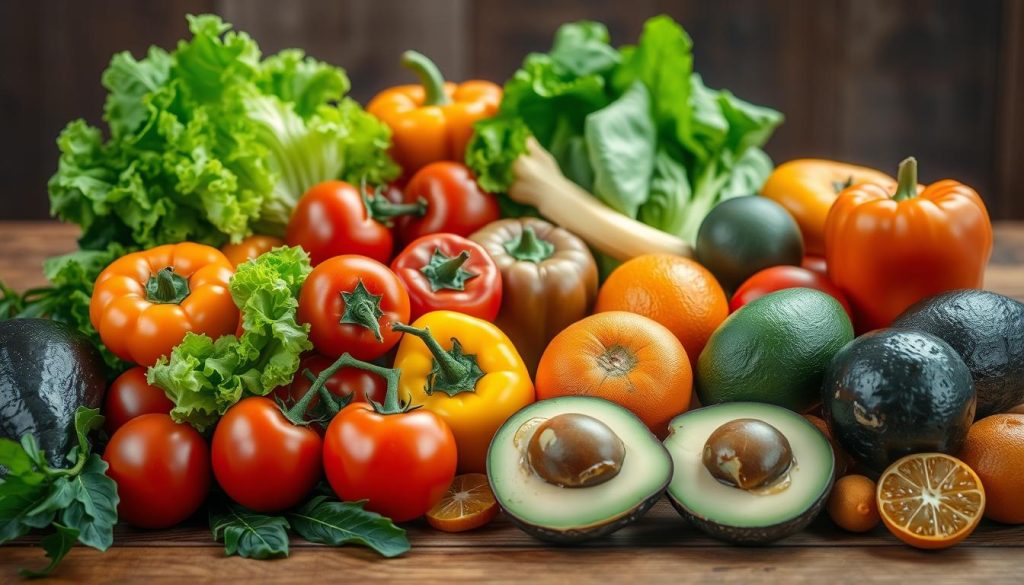
The Benefits of a Nutritious Diet
Choosing a healthy diet full of whole, unprocessed foods brings many benefits. It boosts energy, helps with weight management, lowers the risk of chronic diseases, and improves gut health. By focusing on a balanced, nutrient-dense diet, you can lead a healthier, more vibrant life.
Eating nutritious foods every day nourishes your body and boosts your well-being. Foods packed with essential vitamins, minerals, and fiber keep your body running smoothly. They also strengthen your immune system and support digestive health. Plus, a diet rich in whole, plant-based foods can lower the risk of heart disease, type 2 diabetes, and some cancers.
A nutritious diet also benefits your mind and emotions. Healthy foods can improve your mood, brain function, and stress levels. This leads to more vitality and life satisfaction. By choosing healthier foods, you start a journey towards a more balanced and fulfilling life.
FAQ
What are the most common types of unhealthy food?
Unhealthy foods include processed foods, fast food, and high-calorie snacks. Sugary drinks and foods with trans fats, refined carbs, and artificial additives are also bad.
How do processed foods impact our health?
Processed foods have hidden sugars and preservatives. They lack essential nutrients. This can lead to weight gain and chronic diseases.
What are the dangers of fast food?
Fast food is high in calories and unhealthy fats. It’s low in fiber and nutrients. Eating it often can cause weight gain and heart disease.
How does unhealthy food contribute to obesity?
Eating too much of calorie-dense, nutrient-poor foods causes obesity. Easy access to fast food and a sedentary lifestyle also contribute to weight gain.
What is the impact of unhealthy food on heart health?
Foods high in saturated and trans fats harm heart health. They can lead to high cholesterol and blood pressure, increasing heart disease risk.
What are the links between unhealthy food and chronic diseases?
A diet full of processed foods can lead to chronic diseases. These include type 2 diabetes and certain cancers. The lack of nutrients in these foods is harmful.
What are the hidden dangers of food additives and preservatives?
Processed foods often have additives and preservatives that can be harmful. They can disrupt hormones and cause allergic reactions, leading to inflammation.
How does emotional eating contribute to unhealthy food choices?
Emotional eating leads to overeating unhealthy foods. This can cause weight gain and poor gut health. It’s a cycle that’s hard to break.
How can unhealthy food impact gut health?
The wrong foods can upset the balance of gut bacteria. This can cause inflammation and digestive problems, increasing disease risk.
How can reading nutrition labels help identify unhealthy foods?
Reading labels is key to spotting unhealthy foods. Look at the ingredient list and portion sizes to make better choices.
What are some common characteristics of unhealthy foods?
Unhealthy foods often have added sugars, unhealthy fats, and artificial additives. Knowing these signs helps avoid bad dietary choices.
What are some tips for making healthier food choices?
Eat more whole foods like fruits, veggies, lean proteins, and whole grains. Limit processed and high-calorie foods. A balanced diet is essential for health.
What are the benefits of a nutritious diet?
A nutritious diet boosts energy, helps with weight management, and reduces disease risk. It also improves gut health. Making smart food choices leads to a healthier life.






